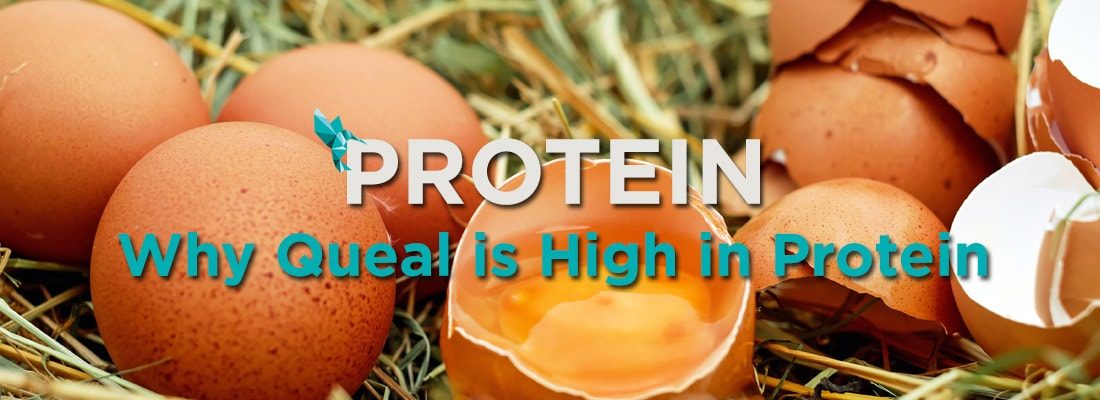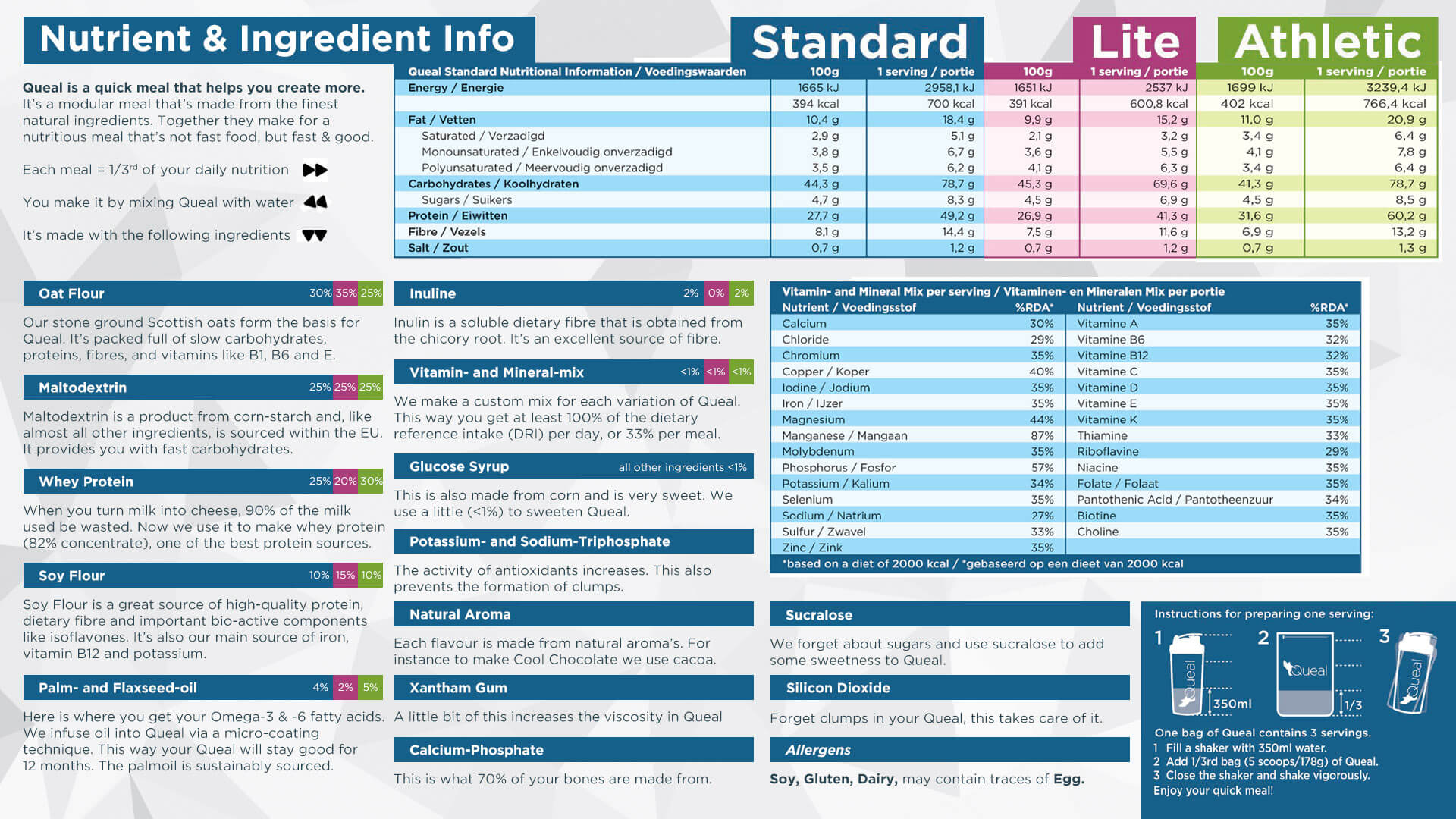
Protein – Why Queal is High in Protein
Why Queal is High in Protein
Hello awesome person! Today I’d like to talk about protein. I have received several interesting questions from customers regarding the quantity of protein in Queal, and about its effects on the body. I also want to debunk a myth that is going about regarding high-protein diets and kidney damage. Lastly, I want to say a few things about our current source of protein, and what we like and dislike about it.
Protein is necessary for the body’s ability to grow and repair itself, especially muscles. Proteins are broken down into base amino acids by the metabolism. All human proteins are made up of the same 20 amino acids, 9 of which must be consumed through diet, in different amounts. Queal’s source of protein comes from whey, soy, and oats, and contains all the essential amino acids.
The level of protein in Queal is relatively “high”. With 43 grams per meal, three meals of Queal deliver 229% of the Recommended Daily Amount of protein. Please note that the RDA is an amount set to prevent deficiencies, but that does not mean it is the perfect amount needed for your body. For most nutrients, the amount is actually higher (up to a point).
In order to reach the “normal” level of 2100kcal per day, Either protein RDA, fat RDA, or carbohydrate RDA, (or a combination of all three), needs to be exceeded, because the calories have to come from somewhere, and just the “recommended daily amount” is insufficient to provide 2100kcal. We decided to boost mostly the protein in our recipe, as that appeared to have the most beneficial effects on the body in larger-than-necessary quantity. Protein is used to repair muscle tissue and increase fitness.
Protein and Your Kidneys
There is some talk, mostly on the internet, claiming that high protein diets cause kidney problems. This is a “fact” bandied about which has absolutely no scientific research to back it up.
There is some evidence that suggests that higher than normal protein diets for people with diagnosed kidney diseases are somewhat harmful1, 2, but the same is not true for healthy people.
Actually, research has been done looking at kidneys of bodybuilders, who ingest vast amounts of protein, both from food and supplements, and their kidneys were just fine3, 4.
There are two main risk factors correlated with kidney failure: high blood pressure, and diabetes. There is actually evidence that both of these conditions could in fact be somewhat helped or prevented by a higher-than-normal protein intake5, 6, 7, 8.
So to conclude, we’ve made a conscious choice to have a relatively “high” level of protein in Queal. And although there is an unfortunately perpetuated myth about the negative effects of high-protein diets on kidneys, there is no evidence-based research that supports these claims. If anything, a high-protein diet might decrease your chances of long-term kidney troubles. As always, we highly recommend reading into this yourself or contacting your personal health professional to see if Queal is right for you.
Our Whey Protein
Let’s talk protein sources for a moment. Currently, Queal uses Undenatured Whey Protein Concentrate (82%), which is derived from the cheese-making process. Our Whey Protein is whey protein concentrate, which is agglomerated and instantiated. It is sourced from the UK, and therefore adheres to all strict EU food health- and safety- regulations.
Although we are very happy with the nutritional value, flavour profile, and texture of this source, there are some limiting factors. It is the only thing keeping Queal from becoming vegan, rather than vegetarian. Furthermore, it has (very small) quantities of lactose as well. This is why we are looking into different types of protein for our source.
Pea protein has been suggested by several customers. The problem with it is that it has a strong and honestly quite bad taste. Aside from that, it is also relatively expensive to source. The same applies for Hemp- and Brown Rice-based proteins.
We are constantly working on improving Queal, and finding the perfect source of protein is high on the list of potential improvements.
References:
1.
Effects of dietary protein restriction on the progression of advanced renal disease in the Modification of Diet in Renal Disease Study, Levey AS, Adler S, Caggiula AW, England BK, Greene T, Hunsicker LG, Kusek JW, Rogers NL, Teschan PE.
http://www.ncbi.nlm.nih.gov/pubmed/8629624
2.
Effects of dietary protein restriction on the progression of moderate renal disease in the Modification of Diet in Renal Disease Study.
http://www.ncbi.nlm.nih.gov/pubmed/8989740
3.
High-Protein Weight Loss Diets and Purported Adverse Effects: Where is the Evidence?, A H Manninen.
http://www.jissn.com/content/1/1/45
4.
Dietary protein intake and renal function, W F Martin, L E Armstrong, N R Rodriguez.
http://www.nutritionandmetabolism.com/content/2/1/25
5.
Effects of Protein, Monounsaturated Fat, and Carbohydrate Intake on Blood Pressure and Serum Lipids; Results of the OmniHeart Randomized Trial, L J Appel, F M Sacks, V J Carey, E Obarzanek, J F Swain, E R Miller, P R Conlin, T P Erlinger, B A Rosner, N M Laranjo, J Charleston, P McCarron, L M Bishop.
http://jama.jamanetwork.com/article.aspx?articleid=201882
6.
Dietary protein and blood pressure: a systematic review, W Altorf-van der Kuil, MF Engberink, EJ Brink, MA van Baak, SJ Bakker, G Navis, P van ‘t Veer, JM Geleijnse.
http://www.ncbi.nlm.nih.gov/pubmed/20711407
7.
Effect of a High-Protein, Low-Carbohydrate Diet on Blood Glucose Control in People With Type 2 Diabetes, M C Gannon, F Q Nuttall.
http://diabetes.diabetesjournals.org/content/53/9/2375.short
8.
An increase in dietary protein improves the blood glucose response in persons with type 2 diabetes, M C Gannon, F Q Nuttall, A Saeed, K Jordan, H Hoover.
http://ajcn.nutrition.org/content/78/4/734.short
Join our list and receive an ebook for free.




No Comments